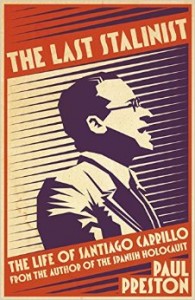Book Review: When the Party Was Over
 Paul Preston, The Last Stalinist: The Life of Santiago Carrillo (New York: William Collins: 2015).
Paul Preston, The Last Stalinist: The Life of Santiago Carrillo (New York: William Collins: 2015).
Few, if any, historians of modern Spain can match the work of the prolific Paul Preston. His mastery of primary sources in several languages, his careful eye for human detail, the breadth of his knowledge, have all made him an indispensible guide to the country’s recent past. It will be a long time before any other work surpasses his The Spanish Holocaust as the definitive reckoning of what people on both sides suffered in the Spanish Civil War and its aftermath. He has never let his wish that the Republic had won that war restrain him from criticizing the mistakes and misdeeds of some of its defenders.
Over the course of his 97-year life, Santiago Carrillo, long-time leader of the Communist Party of Spain, the PCE, committed more than his share of misdeeds. In Preston’s new biography, Carrillo has few redeeming features. He shared responsibility for the worst single wartime massacre by the Republic, the shooting of more than 2,300 prisoners, mostly captured Nationalist officers, outside Madrid in 1936. Later Carrillo alternately took credit for this or denied his complicity, depending on whom he was talking to. He had no hesitation in callously denouncing friends, mentors, even his own father, when it was politically expedient to do so. During the long years when the Spanish party was dependent on Soviet funding, he tacked this way and that according to Moscow’s changing line, ruthlessly purging dissidents who wanted internal party democracy. When convenient, he would accuse someone of being a fascist agent or a “Titoist reptile,” and seems to have arranged the execution of a few of his rivals. Then, with the prospect of Communist participation in electoral politics in a post-Franco Spain, Carrillo skillfully reinvented himself for the public as a democratically-minded Eurocommunist. Meanwhile he continued to run the PCE in the most top-down Stalinist manner.
In Preston’s new biography, Carrillo has few redeeming features.
The reader can’t help but feel, however, that this duplicitous bureaucrat isn’t quite worthy of so much attention from an historian of Preston’s caliber. Carrillo had only just turned 24 when the Spanish Civil War ended, and so his life up to that point takes up less than 100 pages of this book. His political activity back in Spain after Franco’s death is covered in the last 40. The bulk of this biography covers his time in between, 37 years in exile, mostly in France and the Soviet Union. And nothing is more arid than the doctrinal disputes and personal feuds of exile politics. Or, it appears, could be more exhausting than its meetings: at one PCE congress, Carrillo made a speech that lasted a day and a half. In telling the history of this lengthy period, Preston’s focus is almost entirely on Carrillo. He gives us too little sense of what the PCE’s underground life was in Spain during the dictatorship, how members there communicated with, and felt about, Party leaders abroad, and what was the experience of the Party’s unsuccessful attempts at guerrilla warfare.
Nothing is more arid than the doctrinal disputes and personal feuds of exile politics.
All the while, of course, it seemed to Spanish Communists that the stakes were high. Because of its discipline and ties to the Soviet Union, the only major country that would sell the embattled Spanish Republic arms, the PCE had wielded great influence during the war of 1936-39. Often—but, sadly, always wrongly—convinced that Franco’s regime was about to collapse, the party hoped to regain at least some of that power. But the regime ended only with the dictator’s death and by then Communism had lost much of its luster. The party’s share of the national electorate never surpassed 11% and most of the time was far less.
By participating non-violently in post-Franco elections, Carrillo and the PCE played a part in the restoration of democracy in Spain and he won a seat in parliament. His greatest moment of glory came when, on February 23, 1981, some 180 Civil Guards invaded the parliamentary chamber under an officer who fired shots into the ceiling and ordered all members to get down. Carrillo was one of only three who remained standing. Another was the defense minister, General Manuel Gutiérrez Mellado, who defied the Guards and was roughed up by them. He, Carrillo, and several colleagues were then locked up in a room in the building. The coup promptly collapsed when King Juan Carlos went on television to denounce it. The king is remembered as the hero of the occasion, but, unlike the members of parliament, he was never threatened by armed men. Ironically, Carrillo and Gutiérrez Mellado—briefly held under guard but forbidden to speak to each other—had been on opposite sides in the battle for Madrid 45 years before, Carrillo as a member of the city’s Republican defense junta, and Gutiérrez Mellado as a young Falangist officer who supported the military uprising. Their joint defiance of the new uprising was an apt symbol that Spain’s return to democracy was likely to last.
Adam Hochschild is the author of seven books of history, memoir and reportage; his next will be about Americans and the Spanish Civil War.












